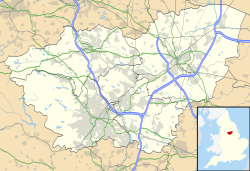Hillsborough Barracks
| Hillsborough Barracks | |
|---|---|
| Sheffield | |
 Hillsborough Barracks | |
| Coordinates | 53°24′05″N 01°29′41″W / 53.40139°N 1.49472°W |
| Type | Barracks |
| Site information | |
| Owner | Ministry of Defence |
| Operator | |
| Site history | |
| Built | 1848 |
| Built for | War Office |
| In use | 1848–1930 |
Hillsborough Barracks is a walled complex of buildings between Langsett Road and Penistone Road in the Hillsborough District of Sheffield, South Yorkshire, England.
Early history
[edit]The complex, which covers an area of circa 22 acres (89,000 m2), dates from 1848, replacing an inadequate barracks at Hillfoot.[1]
The barracks is divided into three terraces. The first (top) terrace faces on to what is now Langsett Road. This contained the Mess establishment, quarters for around 40 officers and a similar number of servants, and a chapel. This building has a length of about 354 feet (108 m) and a width and height of about 40 feet (12 m), is three storeys high and has a mixture of gothic and castellated styles. The other buildings of the barracks consisted of a large five-bedroomed house serving as the Garrison Commander’s Quarters outside the walls, a 58-patient two-storey hospital incorporating a barracks for RAMC personnel, a Dental Clinic and a facility for treating women, infantry soldiers' quarters, a clock tower building, with cavalry soldiers' quarters on the first floor and stabling for 260 horses on the ground floor (total accommodation for 918 NCO and other ranks). There was also a Fives Court, a Riding School, a school for 80 children and accommodation for the schoolmistress, married quarters flats for 50 families provided outside the walls, a Gun Shed housing six Field guns, the Barracks Store with living quarters for the Barracks Sergeant, a Guard Room incorporating a Police Room, Detention Cells, and an exercise yard, a Vehicle Shed (built in 1903) which could house 26 motor cars, a Veterinary Infirmary large enough to house 18 horses, a Granary, four cookhouses and various workshops.[1]
-
Cavalry quarters
-
Main building, Langsett Road
-
Infantry Quarters
-
Guardhouse
-
Chapel
-
Site plan
On the northern side of the Barracks runs the River Loxley. On the night of Friday 11 March 1864 the ill-fated Dale Dyke Dam further up the Loxley Valley at Bradfield burst causing the Great Sheffield Flood and the resulting flood waters breached a stone wall that was three feet thick. The water rose to the height of twelve feet outside the window of Sergeant Foulds' quarters and drowned two of his children.[2]
On 26 July 1932, an auction was held on the instructions of the War Department by Eadon & Lockwood at Sheffield. However, when bidding reached only £12,000, the auction was terminated and the Barracks withdrawn from sale. In October of that year, the complex was sold to Burdall’s Ltd, a manufacturing chemist noted for its gravy salt, and it became known as Burdall’s Buildings.[3]
Redevelopment
[edit]
A major redevelopment of the site was embarked upon in the late 1980s. The result is the large retail and business complex seen today, in which all the surviving structures have been cleaned of the grime from Sheffield's industrial past. The focus of the complex is the Morrisons Supermarket covering the old Artillery Parade Ground, which has been roofed for the purpose and is fronted by the clock-towered stable block. The old Infantry Parade Ground is now a two-storey car park between the Stable Block and the old Officers' Mess (now the headquarters for Sheffield Insulations Ltd). The old football ground and rifle range are now a B&Q DIY Superstore. The Married Quarters which served as flats until the end of the 1970s were demolished and the area is now a McDonald's Drive-through Restaurant. The Garrison Commander’s House was demolished and its site is now covered with a garage and petrol station. The old guard room is now the Garrison Hotel and Jailhouse Bar.[4]
References
[edit]- ^ a b Bailey to Bailey - A Short History of Military Building in Sheffield by Stephen Johnson
- ^ Harrison, Samuel (1864). A complete history of the great flood at Sheffield on March 11 & 12, 1864. S. Harrison. ISBN 0-904293-01-7. OCLC 2905832.
- ^ Britain from above
- ^ "History". Garrison Hotel, Sheffield. Retrieved 9 November 2017.
External links
[edit]- Garrison Hotel Intro is worth watching







